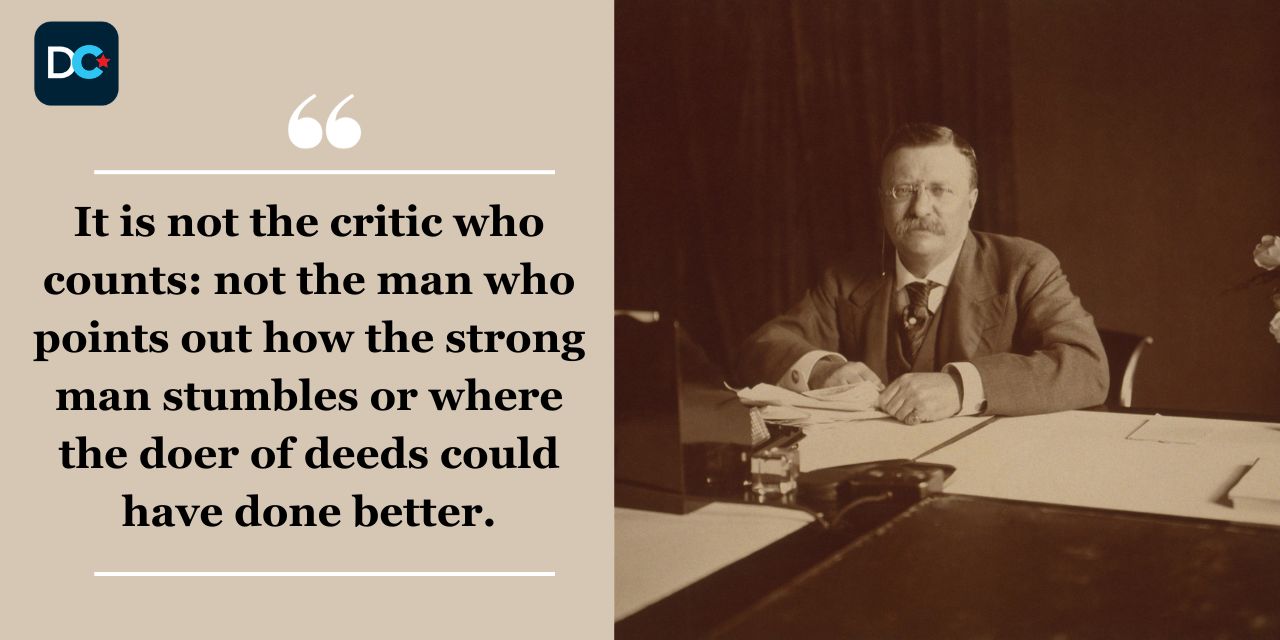Following a hunting safari that brought him to British East Africa, the Belgian Congo, and the Sudan, former president Theodore Roosevelt gave a speech at the Sorbonne University on April 23, 1910.
Part of a “Statesman’s Tour of Europe,” it would go on to become known as “The Man in the Arena” speech – and be quoted and posted countless times throughout the next century.
“It is not the critic who counts: not the man who points out how the strong man stumbles or where the doer of deeds could have done better,” Roosevelt said. “The credit belongs to the man who is actually in the arena, whose face is marred by dust and sweat and blood, who strives valiantly, who errs and comes up short again and again, because there is no effort without error or shortcoming, but who knows the great enthusiasms, the great devotions, who spends himself in a worthy cause; who, at the best, knows, in the end, the triumph of high achievement, and who, at the worst, if he fails, at least he fails while daring greatly, so that his place shall never be with those cold and timid souls who knew neither victory nor defeat.”
The timelessness of Teddy Roosevelt’s sentiments cannot be overstated. With the advent of the internet and the smartphone, it sometimes seems there are more pundits and critics than ever before. And with critics come cynics – whom the late Dr. Adrian Rogers once described as someone “who knows the price of everything and the value of nothing.”
I also loved the famed journalist and essayist H.L. Mencken’s definition. He once said, “A cynic is a man who, when he smells flowers, looks around for a coffin.”
Once upon a time, “cynical philosophy” meant something very different than it does today. Whereas cynics in 2023 are skeptical of people’s motives and interests, cynics back around five hundred years before Christ were those who questioned or challenged conventional dogmas and doctrines. This school of thought was popularized and promoted by Antisthenes, who was a student of Socrates.
Cynics today may also question convention – but there’s an edge and antagonism to it, an assumption that everyone is dumber or more selfish than they are. They often judge others on results and themselves on their intentions.
Religious conservatives are often accused by cynics of wanting to forge a theocracy – a form of government entirely run and judged by people of faith.
Cynics accuse pro-life advocates of wanting to trample on women’s rights and caring more about the baby than the mother.
Moms and dads who are deeply engaged and involved in their children’s education are charged with meddling with the public school system and ignoring decades of formal training.
Critics cry hatred when wedding cake bakers like Jack Phillips and florists like Barronelle Stutzman politely decline to use their gifts and talents to create something contrary to their deeply held religious beliefs.
In all these examples, cynics are accusing conservatives of wanting to run the world – rather than wanting to advocate for policies that we believe will make the world a healthier, happier, and a better place to live.
Christians aren’t immune to cynicism either. While we know the world is sinful and fallen, are we giving others the benefit of the doubt – or quickly drawing conclusions that prove critical and counterproductive?
Despite enduring incredible heartbreaks and headaches, the apostle Paul was no cynic. How else could he have written that, “Love bears all things, believes all things, hopes all things, endures all things” (1 Cor. 13:7)? He was able to say such things because he had a Gospel-centric perspective.
Cynics and critics are not generous. They are quick to convict – the exact opposite of what Paul warned against when he wrote, “If you bite and devour each other, watch out or you will be destroyed by each other” (Gal. 5:15).
As Christians, we must reject this age of cynicism and be willing to climb into the arena of culture that Roosevelt referenced. The very best news is that as believers we know however difficult the day or the details, the best is coming – a fact that should make those who claim Christ the most optimistic men and women on earth.
Photo from Shutterstock.






